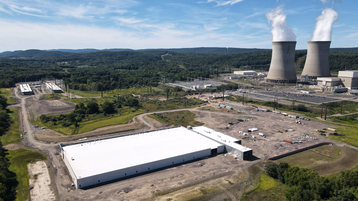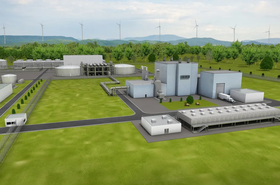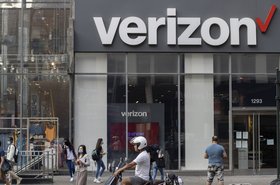Several nuclear plant-owning utilities in the US are likely to sign energy deals with data centers this year, a new report has said.
A recent S&P Global Ratings research note, reported on by UtilityDive, said nuclear operators poised to take advantage include Constellation Energy Group, PSEG Power, and Vistra.
“While this demand narrative could be oversold, or likely not translate into corresponding supply additions because of infrastructure constraints, there is no denying that demand is increasing for the first time in nearly two decades,” S&P said. “Recognizing the demand surge, power prices in almost all markets are higher,” compared with 2023.
S&P noted those higher prices are creating opportunities for nuclear operators to serve data center loads that colocate nearby. Nuclear plants can book a long-term power purchase agreement with pricing above wholesale market rates, while data centers “will save transmission and distribution grid charges,” S&P said.
Microsoft has previously signed a nuclear carbon credits deal with Ontario Power Generation for its operations in Canada, and a nuclear power deal with Constellation to power its Boydton data center in Virginia.
The most notable recent example was Amazon, which acquired a data center built by energy firm Talen at its Susquehanna nuclear energy plant in Pennsylvania. The deal also included a series of Power Purchase Agreements (PPAs) that could scale up to 960MW.
Other energy companies with nuclear plants in operation could be well-set to sign similar deals.
“We think it is reasonable to expect that this will be replicated,” S&P said, pointing to Constellation Energy, PSEG Power, and Vistra as possible candidates with their own dual-unit sites. All three have previously admitted increased capacity demands from data centers, with many hinting at direct deals with operators in the pipeline.
“We will be surprised if there are no transactions announced in 2024,” S&P said.
Public Service Enterprise Group (PSEG), a utility serving New Jersey, has previously said it is in talks to power data centers from one of its units in New Jersey.
“We have had discussions related to both sides of the meter in recent months ... for mid-sized data center construction of approximately 50MW to 100MW, and behind-the-meter inquiries for colocated facilities that prioritize highly reliable carbon-free baseload power from existing facilities,” said CEO Ralph LaRossa.
PSEG Nuclear operates the Salem and Hope Creek Nuclear Generating Stations in Lower Alloways Creek, and is a part owner of the Peach Bottom Nuclear generation station in Delta, Pennsylvania.
Salem has a total generating capacity of 2,295MW; PSEG’s portion is 1,318MW. Hope Creek has a total generating capacity of 1,173MW. LaRossa didn’t disclose which site was in discussion, but said he doesn’t foresee a data center being built there before 2025.
“We think that nuclear complexes such as the Salem and Hope Creek generation stations are potential candidates. They have adequate interconnection, significant generation redundancies, and are ideally located to provide edge computing near load centers,” S&P said.
In May, Business Insider noted that Vistra said it was potentially arranging data center deals for a nuclear plant it owns in Ohio and one in Texas.
"We're seeing customers approach us at a rate that we haven't seen in my history with this industry," Jim Burke, the company's CEO, said in a March earnings call.
Likewise, Constellation has previously said it is exploring deploying small modular reactors (SMRs) at its existing sites to support increased load – including from data centers.
Equinix and Wyoming Hyperscale have previously signed energy deals totaling 600MW with small reactor firm Oklo to power data centers – though further details haven’t been shared. Blockchain firm Standard Power has also announced plans to procure 24 SMRs from NuScale for two US data center sites.
Colocating data centers at nuclear sites has attracted the notice of regulators UtilityDive has previously noted.
“The emergence of data center colocation at existing generation facilities is a business arrangement that raises questions that should be explored regarding issues of basic fairness for all customers on the grid,” Tony Clark, a senior advisor at the law firm of Wilkinson Barker Knauer and a former commissioner with the Federal Energy Regulatory Commission, told a House subcommittee this month.







